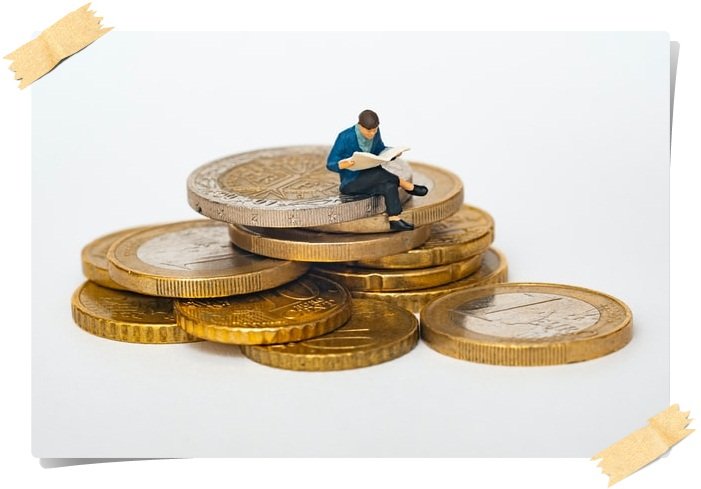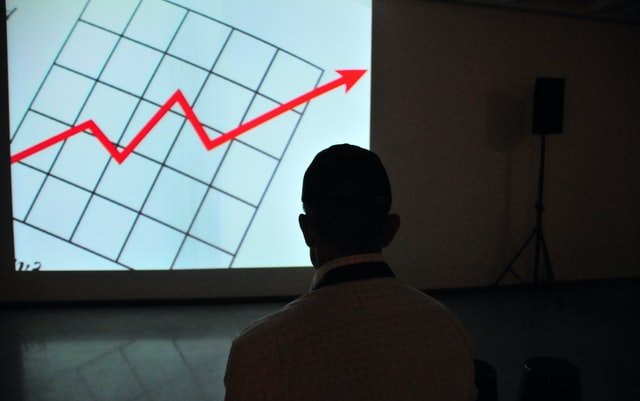[Eng-Esp] A Monk on Wall Street (Part One)

It is no secret that the financial market is currently going through great turbulence and indecision. Therefore, I consider it appropriate to share some reflections inspired by the book "A monk on Wall Street" by José A. Madrigal, because if there is something that is highlighted again and again in each chapter is that we must invest in thinking more long-term, and although this does not mean that short-term operations are not good, it is true that the most profitable is usually to project ourselves to months and years, it is a bit the idea of Warren Buffet when he says that when you buy an excellent stock we should never want to sell it.
Now, this is not an easy task because the main enemy that we must face and dominate is ourselves, this is a core idea of the book that we are about to comment on, and we will do so by highlighting some key ideas.
Monk's mentality
One of the things that caught my attention in this book, besides the number of editions (I read number 15) was its title, what does the author mean with the figure of a monk investing? Because evidently there is a teaching to be seen beyond. The point is actually simple, because we know that different feelings and emotions take over the investor, sometimes it is greed and unbridled euphoria, sometimes fear and deep anguish. Well, these are human situations that must be controlled just as monks control their passions, they are masters and lords of them and not the other way around.
In this sense, one of the phrases that struck me the most in the book was: "The ego is the biggest enemy of investors", and so it is, we can see it today because with the situation of the markets in general everyone wants to have the last word ("Everything went to zero", "we already touched the ground", etc.) and the truth is that no one has a crystal ball to know what will happen, we must learn to put emotions aside and, as they say, "think with a cool head.
Para nadie es un secreto que el mercado financiero está pasando actualmente por una gran turbulencia e indecisión. Por ello, considero oportuno compartir algunas reflexiones inspiradas en el libro "Un monje en Wall Street" de José A. Madrigal, ya que si hay algo que se resalta una y otra vez en cada capítulo es que debemos invertir pensando más a largo plazo, y aunque esto no quiere decir que las operaciones a corto plazo no son buenas, sí es verdad que lo más rentable suele ser proyectarnos a meses y años, es un poco la idea de Warren Buffet cuando dice que cuando se compra una acción excelente nunca la deberíamos querer vender.
Ahora esto no es una tarea fácil porque el enemigo principal que debemos enfrentar y dominar somos nosotros mismos, ésta es una idea medular del libro que nos disponemos a comentar, lo haremos resaltando algunas ideas claves.
Mentalidad de monje
Una de las cosas que me llamo la atención de este libro además del número de ediciones (yo leí la número 15) fue su título, ¿Qué querrá decir el autor con la figura de un monje invirtiendo? Porque evidentemente hay una enseñanza que ver más allá. El punto en realidad es sencillo, pues, sabemos que diversos sentimientos y emociones se apoderan del inversor, algunas veces es la avaricia y la euforia desenfrenada, otras el miedo y la angustia profunda. Pues bien, son situaciones humanas que se deben controlar así como los monjes dominan sus pasiones, ello son amos y señores de las mismas y no a la inversa.
En este sentido, una de las frases que más me impactó del libro fue: "El ego es el mayor enemigo de los inversores", y así es, actualmente lo podemos comprobar porque con la situación de los mercados a nivel general todos quieren tener la última palabra ("Todo se fue a cero", "ya tocamos suelo", etc.) y la verdad es que nadie tiene una bola de cristal para saber lo que va a pasar, hay que aprender a dejar las emociones a un lado y, cómo se dice, "pensar con cabeza fría.".

Source

Investing responsibly
When I come across the word "responsibility" I like to remember its meaning, which is "to answer for our actions". Well, one of the most fundamental things we must keep in mind when investing is that it is our money and wherever we are going to put it we have to do it with conscience, not forced by anyone or just because we heard that it was a good opportunity, that there is a previous study of the stock or asset that we are going to choose is one of the most basic principles for this very reason.
To be responsible when investing is to have a plan of action, therefore, when we are going to invest it is also very important to have a clear methodology to follow, the market conditions that we consider favorable, and even to know how to accept losses because it is not about always winning but to be profitable, that is, that our losses are less than the benefits obtained.
This has to do with self-knowledge, in fact, I once heard an investor say that when he did not feel well, he did not invest, because his best operations were carried out when he was calm, with a calm mind, in control of himself. So, controlling ourselves in order to measure how far we can go becomes a priority.
Invertir responsablemente
Cuando me consigo con la palabra "responsabilidad" me gusta recordar su sentido, el cual es "responder por nuestras acciones". Pues bien, una de las cosas más fundamentales que debemos tener en cuenta a la hora de invertir es que se trata de nuestro dinero y que sea donde sea lo vayamos a poner tenemos que hacerlo con conciencia, no obligados por nadie ni sólo porque escuchamos que era una buena oportunidad, que haya un estudio previo de la acción o activo que vamos a elegir es uno de los principios más básicos por esta misma razón.
Ser responsables a la hora de invertir es tener un plan de acción, por eso, cuando se va a invertir también es muy importante tener clara la metodología a seguir, las condiciones del mercado que consideramos favorables e incluso saber aceptar las pérdidas, pues, no se trata de ganar siempre sino de ser rentables, esto es, que nuestras perdidas sean menores que los beneficios obtenidos.
Esto tiene que ver con el autoconocimiento, en efecto, una vez escuche´a un inversor que cuando no se sentía bien no invertía, ya que sus mejores operaciones las realizaba cuando estaba en calma, con la mente tranquila, en control de sí mismo. Así pues, concerse a sí mismo para medir hasta dónde podemos llegar se vuelve algo prioritario.

Source

Accept Risk
Another of the tips that investors frequently point out is the one related to risk management, therefore, within the mentality that we must train to invest, we can not miss the one that we assume a possible loss, because this protects us against any unknown emotion because if we already knew that it was a possibility there would be no logical reason to get angry or worry. In this sense, the best words in this regard are: "Do not trade without knowing the worst possibility, and without accepting it".
Therefore, it has always been said in this world of investments that we should not invest the money that we are going to need since we can lose it and that is when the problems begin, and all for making decisions from our emotions (greed or fear) and not from logic. It is better to use money that we have left over, that we are not going to need in years, since it even allows us to realize the wonder of compound interest, which is when the capital really grows exponentially.
Finally, it is also important to note here that the best way to calculate the possible profits, as well as the losses, is in percentage form since independently of the capital that is managed we can follow the same pattern, making it easier to control and manage them. Psychologically it makes us work with percentages rather than with whole linear numbers. For example, if I think that I lost $1000 it may seem a lot, but if I broaden the view and consider that this figure is actually 10% of my capital, things change.
Aceptar el Riesgo
Otro de los concejos que con frecuencia señalan los inversores es el referente a la gestión del riesgo, por eso, dentro de la mentalidad que debemos adiestrar para invertir no puedo faltar el que asumamos una posible pérdida, pues, esto nos protege ante cualquier emoción desconocida ya que si ya sabíamos que era una posibilidad no habría razón lógica para enfadarnos o preocuparnos. En este sentido, las mejores palabras al respecto son: "No realice operaciones sin conocer la peor de las posibilidades, y sin aceptarla".
Por eso, siempre se ha dicho en este mundo de las inversiones que no debemos invertir el dinero que vayamos a necesitar puesto que lo podemos perder y es allí cuando empiezan los problemas, y todo por tomar decisiones desde nuestras emociones (codicia o miedo) y no desde la lógica. Es mejor usar para esto dinero que nos sobre, que no vayamos a requerirlo en años ya que nos permite incluso realizar la maravilla del interés compuesto, que es cuando el capital realmente crece de manera exponencial.
Finalmente, también es importante acotar aquí que la mejor forma de calcular las posibles ganancias así como las pérdidas es de forma porcentual, ya que así independientemente del capital que se maneje podemos seguir un mismo patrón, haciendo más fácil el control y la gestion de las mismas. Psicológicamente nos hace más bien trabajar con porcentajes que con números lineales enteros. Por ejemplo, si me quedo con que perdí 1000$ puede parecer mucho pero si amplio el panorama y considero que está cifra en realidad es el 10% de mi capital, las cosas cambian.

Source

Thank you very much for having accompanied me in the reading of this post, wishing you always the best and that we can meet again in the next publication, I say goodbye, see you later.
Muchas gracias por haberme acompañado en la lectura de este post, espero tus comentarios y que nos podamos volver a encontrar en una próxima publicación, hasta luego.


- Traducido con www.DeepL.com/Translator || Translated with www.DeepL.com/Translator


https://twitter.com/JBitcoins/status/1542830287763247105
The rewards earned on this comment will go directly to the people( @jesusalejos ) sharing the post on Twitter as long as they are registered with @poshtoken. Sign up at https://hiveposh.com.